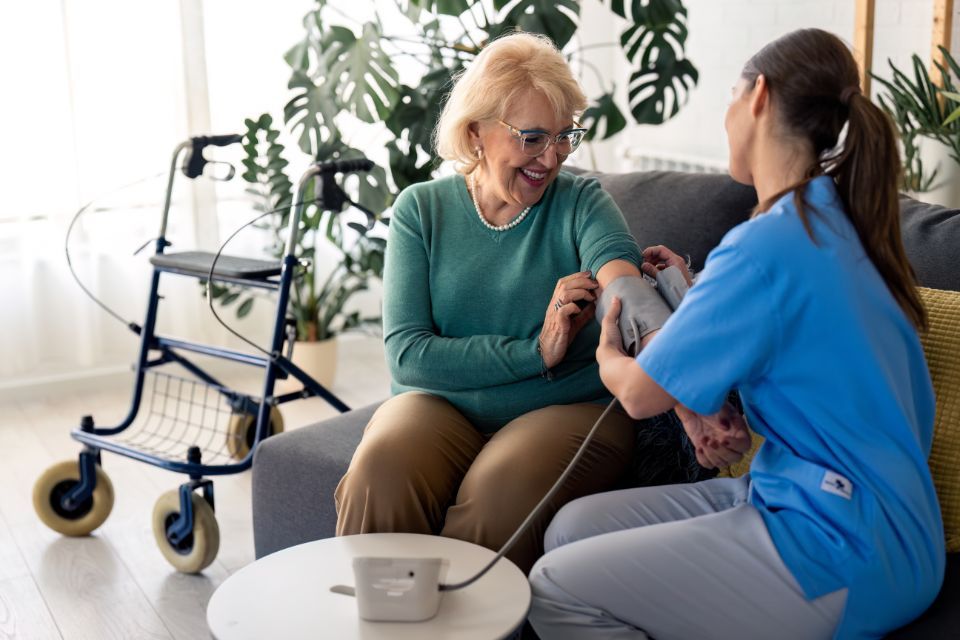What Is In-Home Care? (Aging In Place)
At Senior Care Solutions USA, we know that In-Home Care (Aging in Place) is a specialized service designed for seniors who prefer to receive supportive care within the familiar environment of their own residence.
This type of care may encompass companionship, assistance with activities of daily living (ADLs), home health care to address medical needs, or a combination of these services. Commonly referred to as In-Home Care or (Aging in Place), this service allows seniors to age safely in place while providing family members with peace of mind.
We at Senior Care Solutions USA understand that many older adults prefer to age in place and can often do so with the support of family members and the professional caregivers from Senior Care Solutions USA.
It is understood at Senior Care Solutions USA, as the family and our caretakers recognize changes in the health and behavior of your loved one it is essential to determine when it is appropriate to offer additional assistance, make home modifications, or consider senior living options (Placement 24-hour care). To prevent caregiver burnout, it is also important to acknowledge the family’s limitations when providing care for your loved one at home.

According to a 2021 survey conducted by AARP, nearly 80% of senior adults aged 55 and older prefer to remain in their homes as they age. This concept is commonly referred to as "Aging in Place."
In-Home Care is split into two main categories:

Nonmedical In-Home Care
Nonmedical In-Home Care encompasses a variety of services aimed at assisting seniors who wish to age in place. The primary categories of nonmedical home care include homemaker services and personal care services. While some seniors may require only minimal assistance, others who need more comprehensive support can combine multiple services to develop a tailored care plan that meets their specific needs.
For seniors who wish to age in place, the following benefits of in-home care can be highly advantageous.
- Mobility support - Our caregivers can help with mobility and transfers, reducing the risk of falls and other household accidents.
- Housekeeping - We can provide light housekeeping services to help a senior maintain a clean, safe, and organized household.
- Personal care - Daily personal hygiene tasks can become a challenge for many aging seniors. Our caregivers can help with activities such as bathing, dressing, toileting, and incontinence care.
- Companionship - Feelings of isolation can have an impact on a senior’s mental health. Occasional or frequent visits for conversations or activities can help support the social needs of seniors who live alone.
- Health monitoring - While non-medical home care doesn’t include skilled home health care services, caregivers can provide supervision, note changes in a senior’s health, and communicate with their family.
- Organizational assistance - From helping to manage bills to keeping track of appointments, caregivers can offer senior assistance with daily organizational tasks.
- Meal preparation - Many seniors benefit from assistance with preparing meals or having meals prepared for them. Caregiver visits to prepare meals help seniors maintain consistent and nutritious eating habits and may also offer companionship.

Medical In-Home Care
Medical In-Home Care is medical in nature. It’s usually prescribed for homebound seniors who require skilled care at home for a health condition or after a hospital stay.
Services can include skilled nursing care, like wound care and medication administration, and skilled rehabilitation services, like physical therapy.
Home health care services are provided or at least overseen by licensed medical professionals.
For seniors recovering from illness, surgery, or managing chronic conditions, the following medical in-home care services can provide essential support:
- Skilled nursing care – Registered nurses can provide wound care, administer medications or injections, manage IV therapy, monitor vital signs, and assist with post-surgical care under a physician’s direction.
- Physical therapy – A licensed physical therapist can assist with exercises and mobility training to help regain strength, balance, and coordination after injury, illness, or surgery.
- Occupational therapy – Therapists work with seniors to improve the ability to perform daily living tasks through adaptive techniques and therapeutic activities that promote independence.
- Speech therapy – Seniors recovering from stroke or other neurological conditions may receive in-home speech therapy to address communication disorders, swallowing difficulties, or cognitive impairments.
- Medical social services – A medical social worker can help families navigate healthcare options, connect with community resources, and provide counseling or support during major health transitions.
- Home health aide support – In addition to skilled services, a home health aide may assist with basic personal care tasks under the supervision of a nurse or therapist, ensuring continuity of care.


